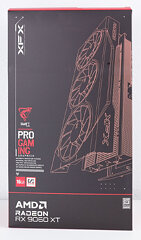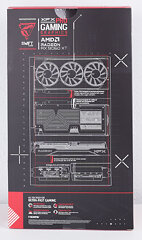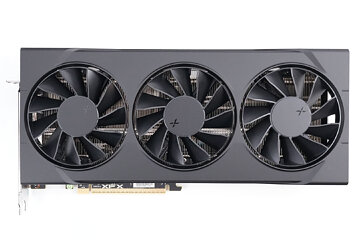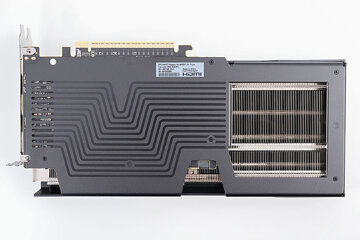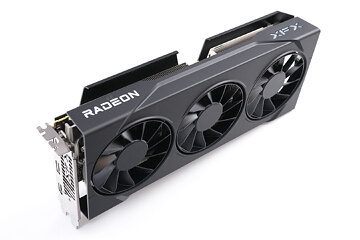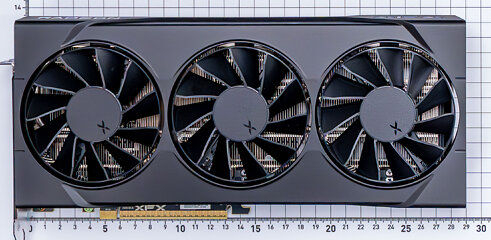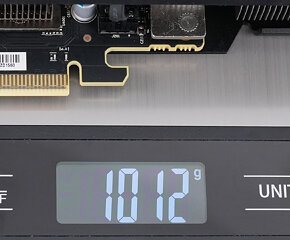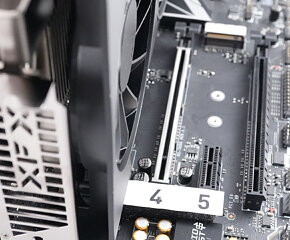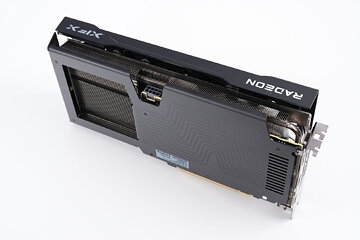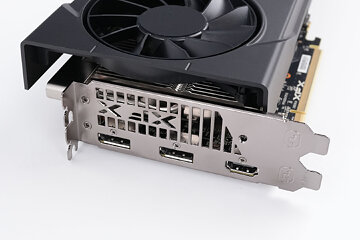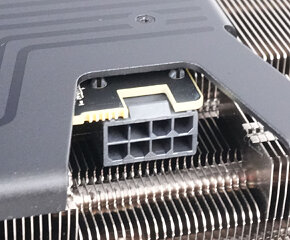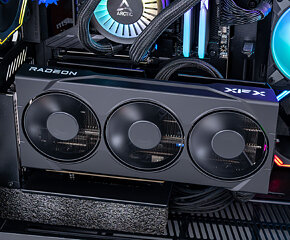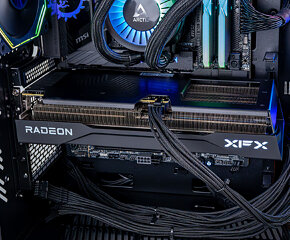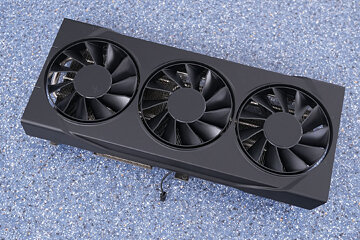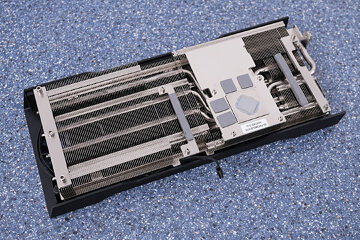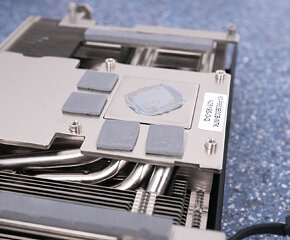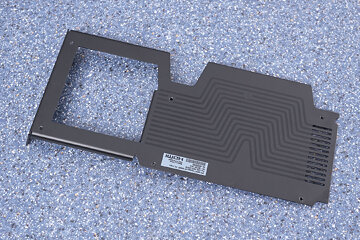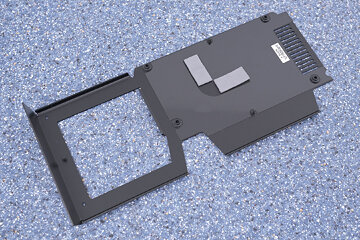 15
15
XFX Radeon RX 9060 XT Swift OC 16 GB Review
Circuit Board Analysis »Packaging
The Card
XFX uses a very clean "mostly-black" look for their card. The main cooler has a softish surface structure which feels nice. On the back you get a high quality metal backplate with a large cutout for air to flow through, the front cooler shroud is made from plastic.
Dimensions of the card are 29.0 x 13.5 cm, and it weighs 1012 g.
Installation requires three slots in your system. We measured the card's width to be 55 mm.
Display connectivity includes two standard DisplayPort 2.1b and a HDMI 2.1b.
AMD put in some extra work for creative professionals, particularly those into video editing, by giving Navi 44 its latest video engine. The video engine supports concurrent hardware-accelerated encode and decode for AV1, HEVC, and H.264 video codecs. With RDNA 4, AMD has improved the image quality of H.264 encoding at lower bitrates, which should make AMD appeal to content creators. The AV1 encoder and decoder support B-frames, a technology with which there can be a significant reduction in bitrates without a loss in image quality. While the RX 9070 Series has a dual encoder setup, the GPU of the RX 9060 XT comes with just a single encoder.
The card uses a single 8-pin connector, which allows a maximum power draw of 150 W, plus 75 W from the slot, but the actual board power limit is set much lower of course.
XFX has installed a lighting zone in the XFX logo at the end of the top edge of the card.
Teardown
XFX has installed four heatpipes on their thermal solution, the main heatsink also provides cooling for the memory chips and VRM circuitry.
The backplate protects the card against damage during installation and handling. Note the thermal pads, which provide cooling for the memory chips on the back side of the PCB.
Jul 25th, 2025 07:49 CDT
change timezone
Latest GPU Drivers
New Forum Posts
- Which Linux flavor? (58)
- AI Job Losses: let's count the losses up, total losses to AI so far 94,000 and counting (65)
- R9 7900X - 5070Ti - Lags / Stuttering (31)
- What's your latest tech purchase? (24363)
- DTS DCH Driver for Realtek HDA [DTS:X APO4 + DTS Interactive] (2233)
- Questionable quality future game releases being considered (3)
- Sapphire ATI 4850x2 - messed up the flash.... (4)
- How to get free Windows 10 security updates through October 2026: Two ways (9)
- Lexar NM790 (4TB) made my PC go back to Windows XP days, since it caused my PC to be SO slow and laggy! (27)
- Kindly help me to complete my new PC build... (7)
Popular Reviews
- Noctua NF-A12x25 G2 PWM Fan Review
- MSI MPG B850I Edge Ti Wi-Fi Review
- UPERFECT UMax 24 Review
- Cougar OmnyX Review
- TerraMaster F4-424 Max Review - The fastest NAS we've tested so far
- VAXEE XE V2 Wireless Review
- Sharkoon OfficePal C10 Review - Affordable and Decent
- Thermal Grizzly WireView Pro Review
- Upcoming Hardware Launches 2025 (Updated May 2025)
- Razer Blade 16 (2025) Review - Thin, Light, Punchy, and Efficient
TPU on YouTube
Controversial News Posts
- Some Intel Nova Lake CPUs Rumored to Challenge AMD's 3D V-Cache in Desktop Gaming (140)
- AMD Radeon RX 9070 XT Gains 9% Performance at 1440p with Latest Driver, Beats RTX 5070 Ti (131)
- AMD's Upcoming UDNA / RDNA 5 GPU Could Feature 96 CUs and 384-bit Memory Bus (121)
- NVIDIA GeForce RTX 5080 SUPER Could Feature 24 GB Memory, Increased Power Limits (115)
- NVIDIA DLSS Transformer Cuts VRAM Usage by 20% (99)
- AMD Sampling Next-Gen Ryzen Desktop "Medusa Ridge," Sees Incremental IPC Upgrade, New cIOD (97)
- NVIDIA Becomes First Company Ever to Hit $4 Trillion Market-Cap (94)
- Windows 12 Delayed as Microsoft Prepares Windows 11 25H2 Update (92)
